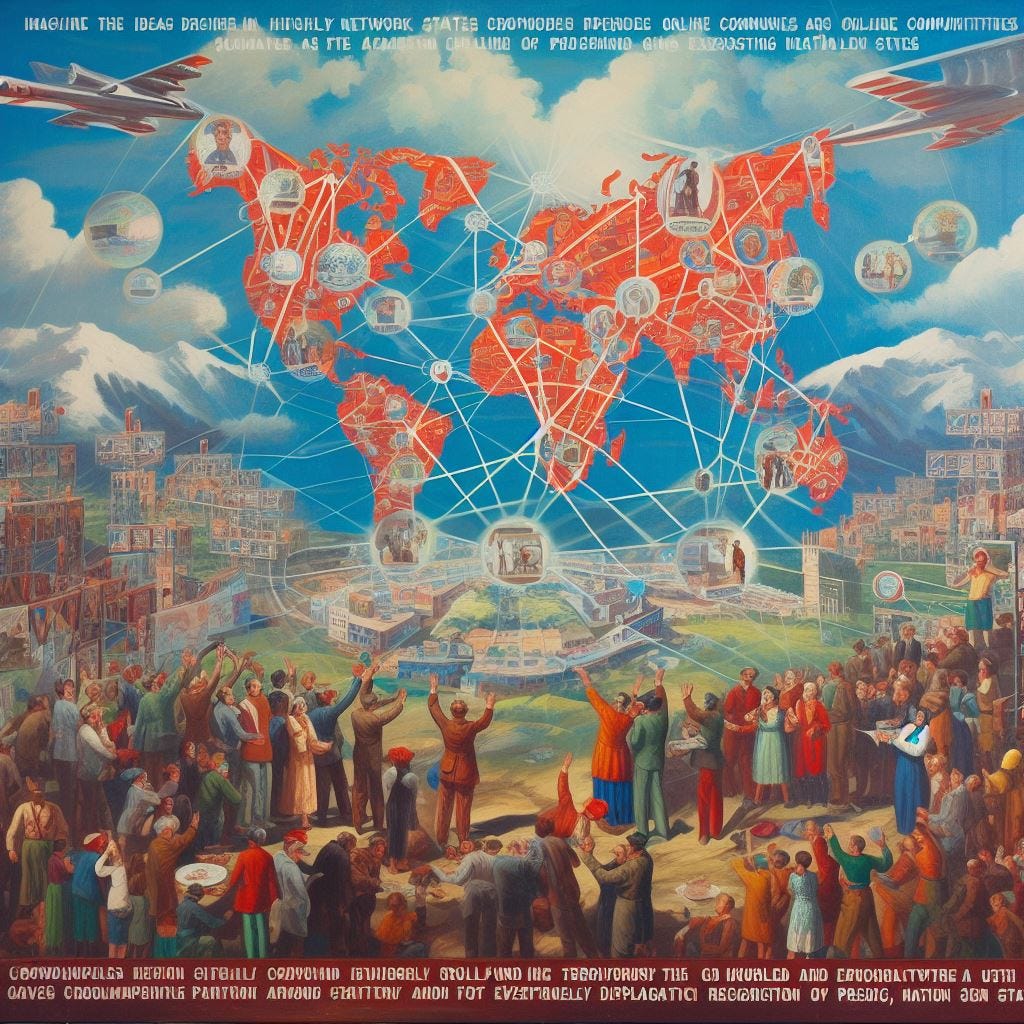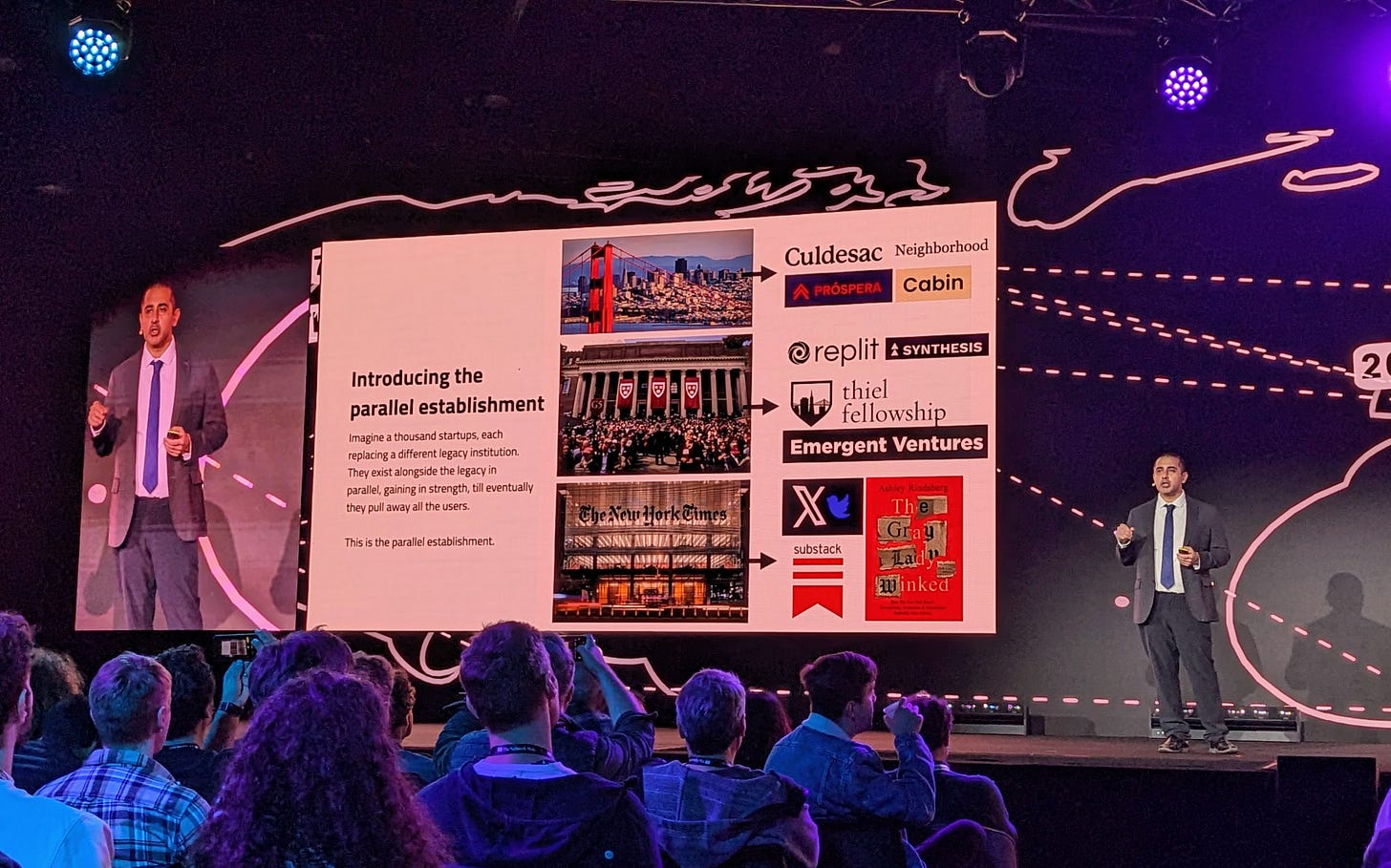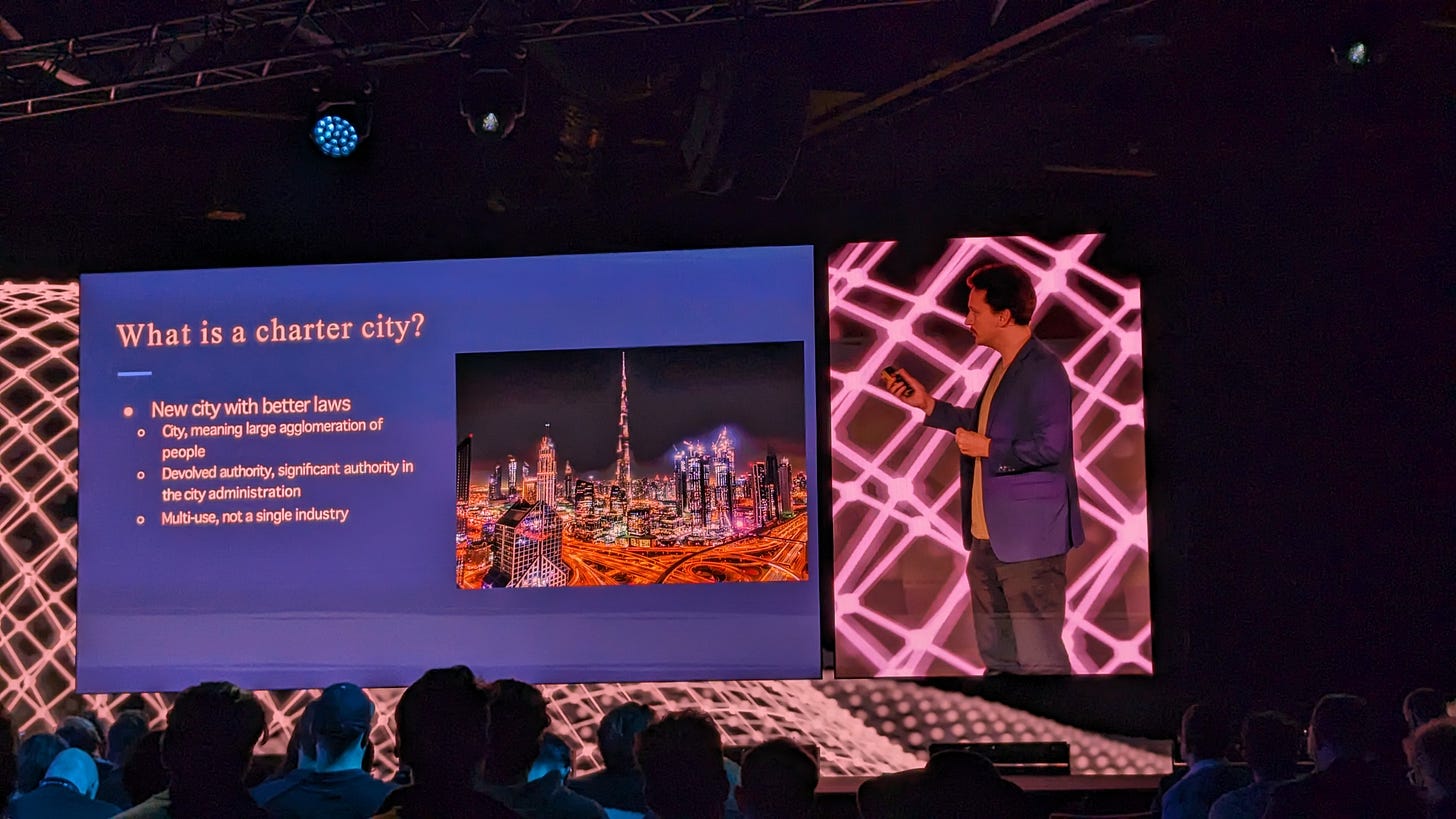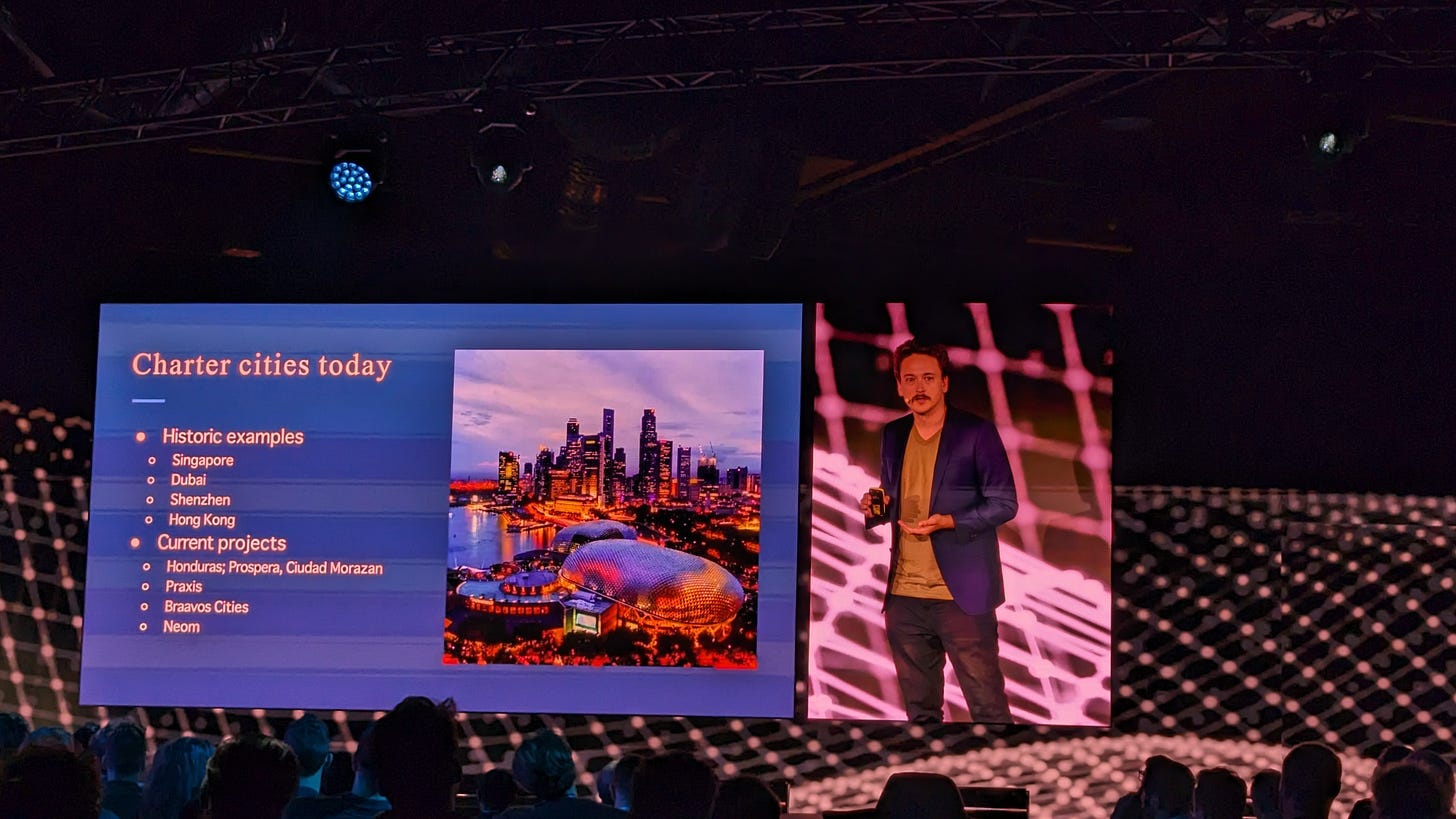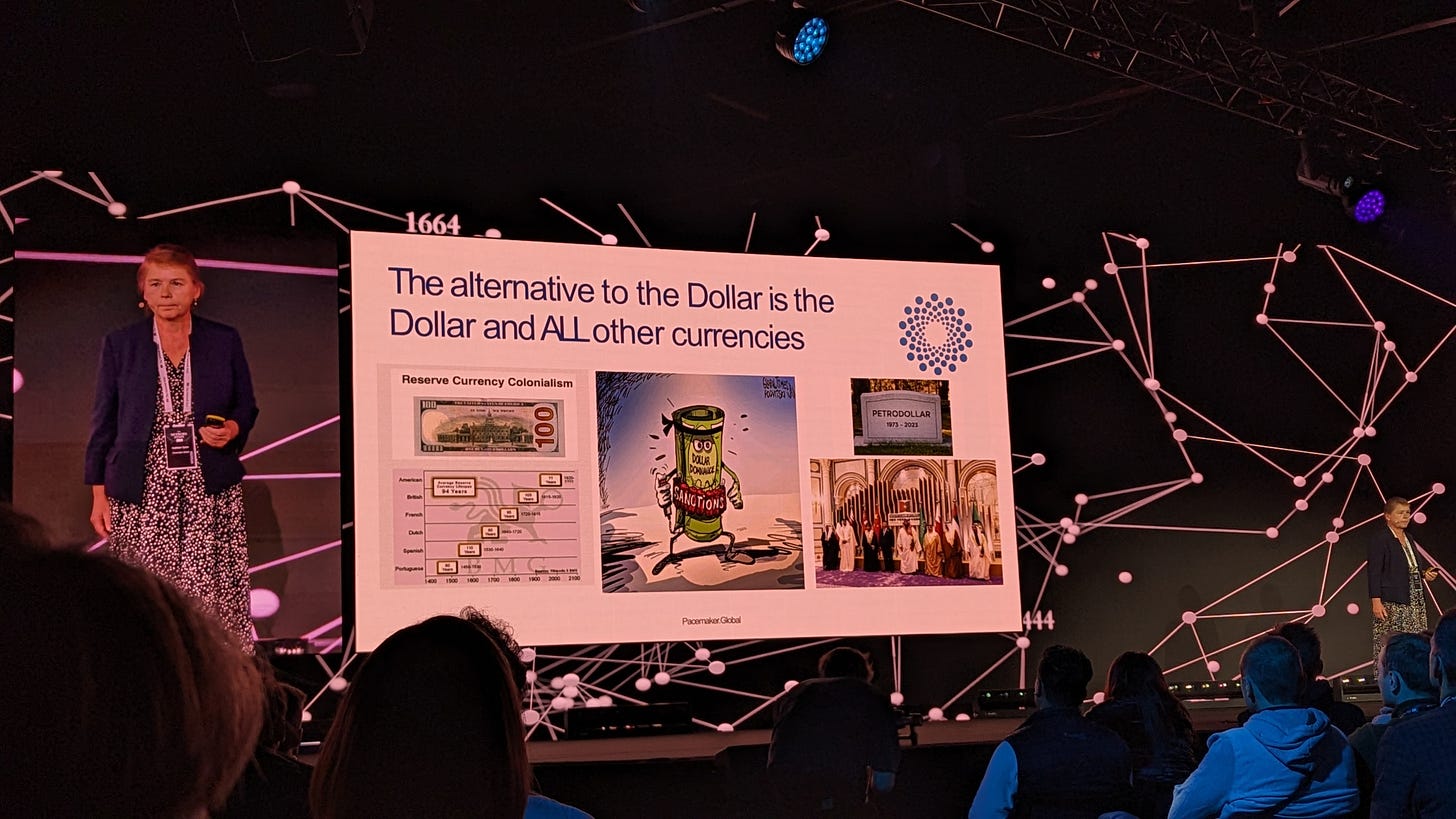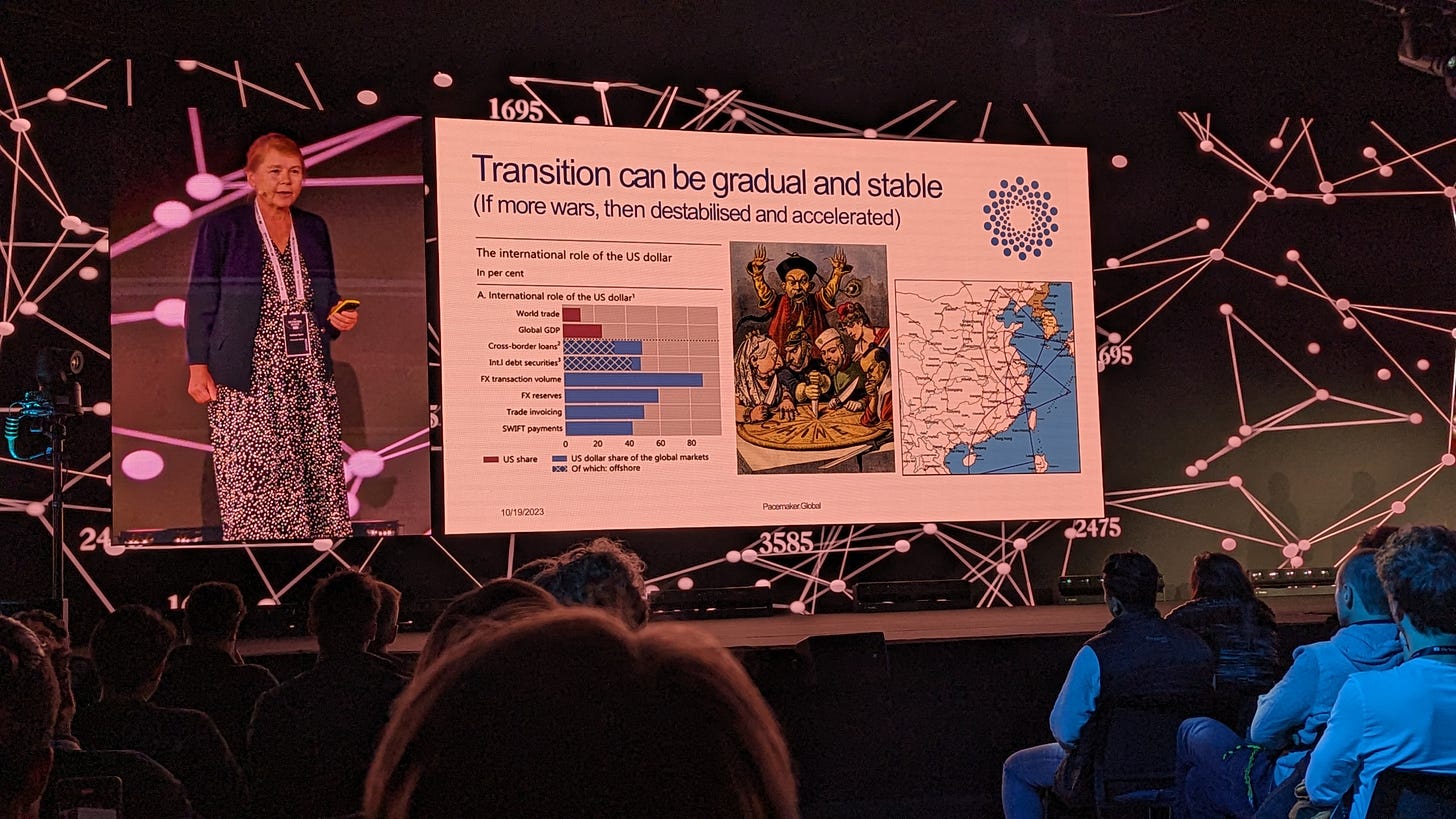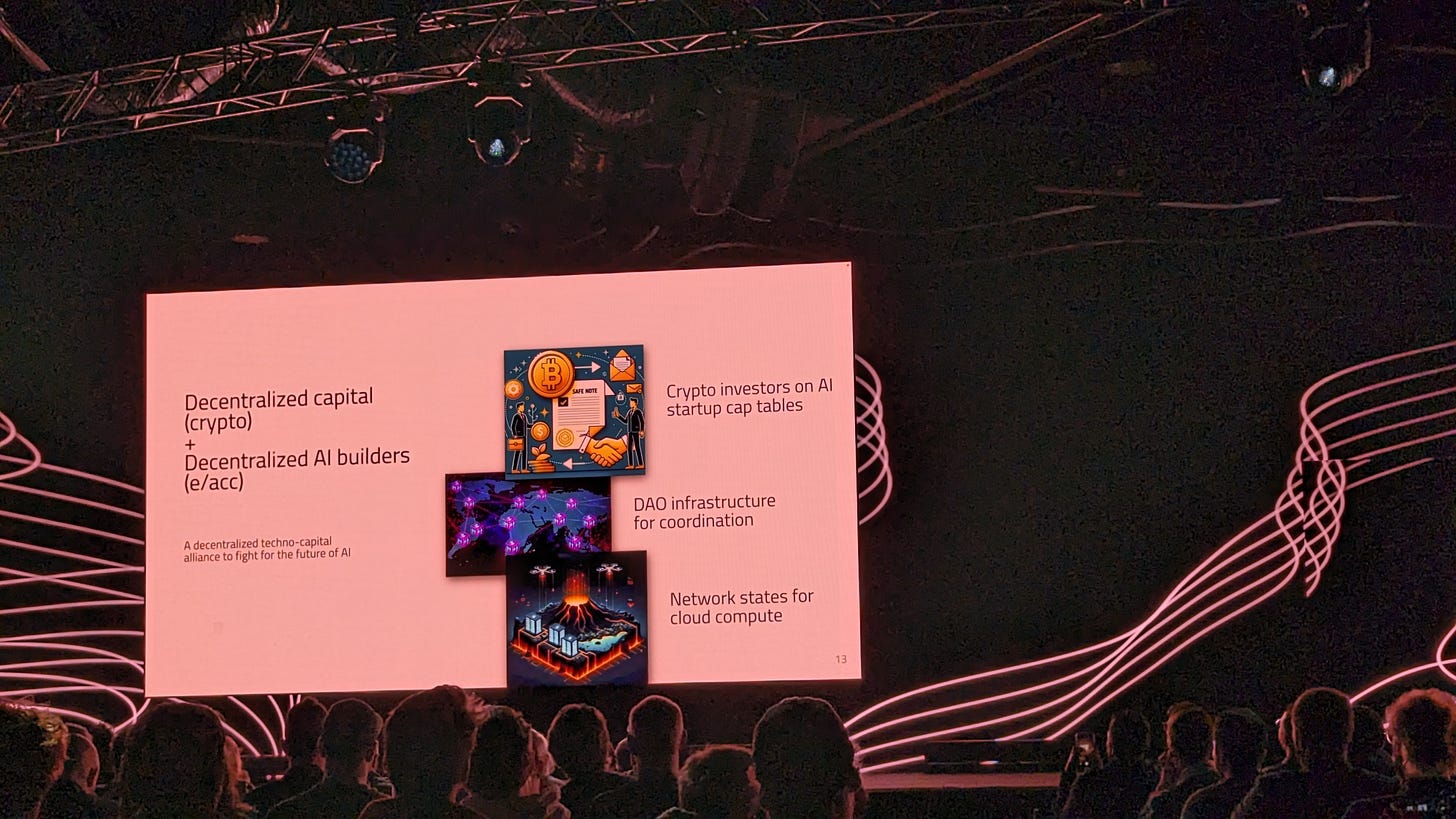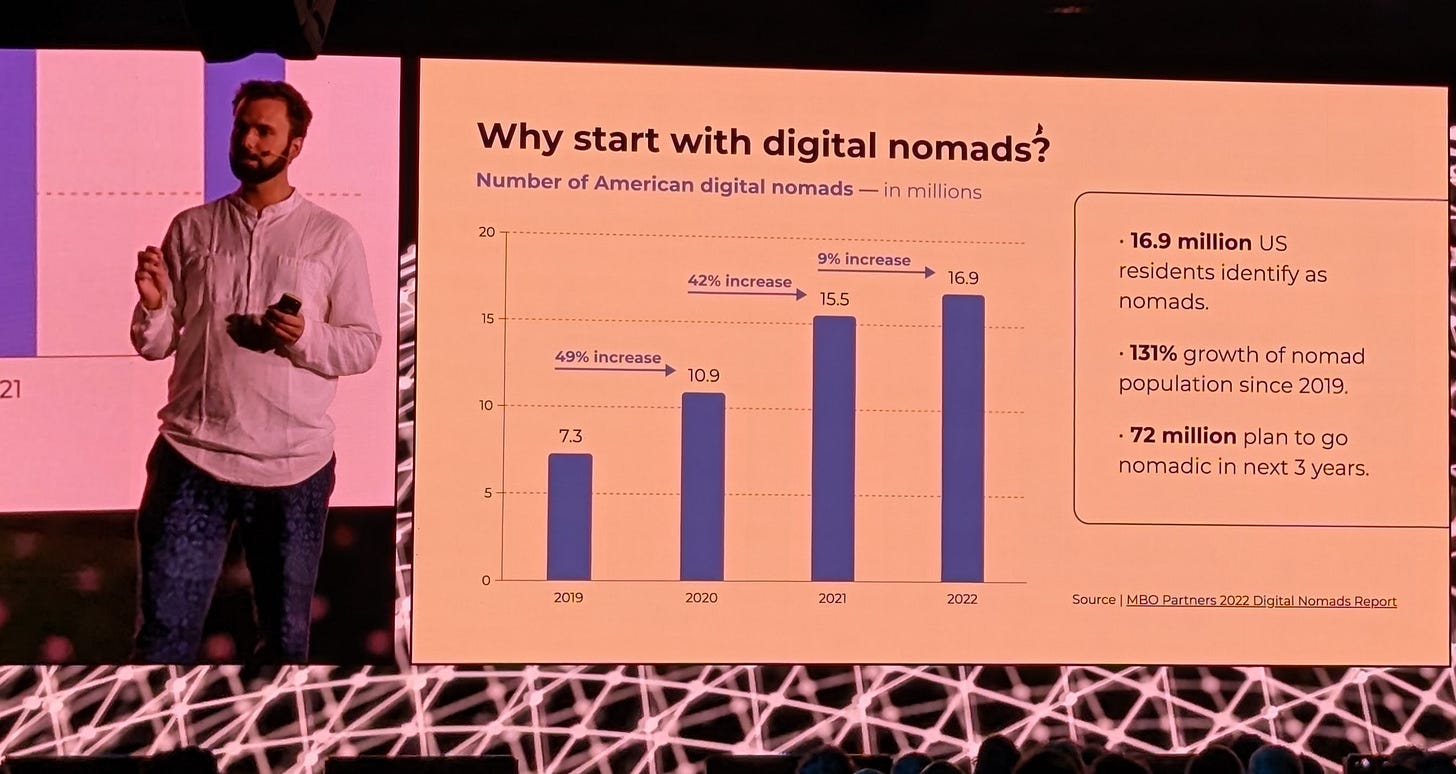Issue #4: Special Edition from the Network State Conference in Amsterdam
Exploring the Collision of Enterprise, AI, and the Rise of Decentralised Communities
How often do you hear of a conference and think, "Oh great, another echo chamber for tech buzzwords and platitudes"?
But what if there was an event that genuinely challenges the status quo, bringing together not just technologists but visionaries and pioneers at the intersections of governance, AI, and societal change?
That's precisely what happened at the recent Network State Conference in Amsterdam. The full conference is available to watch on YouTube.
Imagine a world where governance isn't tied to geographical lines on a map but organised around online communities.
Now, picture an enterprise (or network state for that matter) that doesn’t just compete on products or services but on its very system of governance and ideological alignment.
Sounds crazy? Its not that crazy and we're diving deep into this brave new world in this special edition.
And in true Uncharted Algorithm style, we'll be probing the unquestionable, entertaining radical viewpoints, challenging the very frameworks that society takes for granted.
What is the Network State?
Let's start from scratch.
“A network state is a highly aligned online community with a capacity for collective action that crowdfunds territory around the world and eventually gains diplomatic recognition from pre-existing states.”
Think of it like this: imagine if everyone on Reddit or Twitter who share similar political views, ideals, or cultural norms could actually form a 'country.'
It sounds like a concept out of a sci-fi novel, but it's becoming increasingly plausible with advancements in technology.
Balaji Srinivasan: The Man Behind the Vision
You're probably wondering who came up with this idea.
His name is Balaji Srinivasan. Balaji is a prominent technologist, entrepreneur, and thinker, known for his ventures in the cryptocurrency domain, his former role as CTO of Coinbase, and his provocative writings on a wide range of topics including decentralised technologies, and the potential of blockchain to reshape the global order.
Balaji suggests that in the digital age, governance could be decentralised. That means it doesn't need to operate from one central place or a government.
Balaji also explains why the current centralised structures and institutions are breaking down across education, media, science etc.
For a deeper dive into the shortcomings of the current centralised system, I highly recommend checking out the book, The Network State. It's available to read online for free!
Crypto: The Financial Glue
Cryptocurrency, or crypto, is a big deal here. In a Network State, it could serve as the unifying financial system.
Now, for those of you new to crypto, think of it as digital or virtual currency that uses cryptography for security.
Traditional states have their own currency, like the dollar or euro, right?
Well, a Network State could have its own crypto, giving it financial independence and less reliance on existing systems.
Despite of what you have heard and believe about crypto - there is no denying that Bitcoin the original crypto is a force to reckon with in world of central banks and financial markets.
DAOs: The Governance Model
Okay, you've probably seen the acronym DAO (Decentralised Autonomous Organisation) being thrown around.
A DAO uses blockchain technology to establish a sort of 'rule book' for how the organisation should be run.
It's like a democratic organisation but in digital form.
A Network State could be managed by a DAO, allowing for a collective, yet decentralised, decision-making process.
Charter Cities: Physical Spaces for Digital Communities
You're thinking, "All this digital talk is great, but what about physical space?"
Enter Charter Cities.
These are designated zones where Network States can actually implement their governance models in the real world.
These zones would be in partnership with existing nation-states but operate under their own set of rules.
Essentially, it's a city that serves as a real-world manifestation of its online counterpart.
The kicker is that we already have a number of successful charter cities operating in the world - Singapore, Dubai, Shenzhen, Hong Kong!
Now that we have introduced some of the basic concepts - what happened at the conference?
Key Highlights
The conference was an amalgamation of diverse perspectives.
It had charter city evangelists, crypto aficionados, advocates for digital governance through DAOs, educational disruptors, media disruptors.
I also met a number of professionals from traditional sectors like law, banking, and also bumped into a few people from traditional tech giants who recognised that this is the new frontier.
This eclectic mix added richness to the discussions but also led to some tensions and contradictions.
A Clash of Ideologies
As fascinating as the event was, it wasn't without its critics.
A segment of the hardcore crypto community seemed disenchanted. They questioned whether the new wave of Network States would genuinely benefit local populations or if they were just trendy buzzwords for real estate and SaaS companies to profit off.
The criticisms touched upon crucial points: are we truly decentralising, or are we just crafting an alternate form of centralisation?
Living in a Fairy Tale?
There were those who felt that the Network State proponents were glossing over pragmatic concerns.
Establishing a sovereign entity isn't merely a software problem to solve. Security, both digital and physical, is paramount.
Nations won't happily let their brightest minds and tax revenue vanish into these emerging Network States.
Hence, concerns around possible retaliation or double taxation by existing nation-states can't be ignored.
Parallel Cities and the Network State Stack
Among the bright spots was Plumia, a company taking a more balanced approach.
They suggested that Network States can't afford to be combative against traditional nations but should aim for a harmonious co-existence.
Their forward-thinking software stack that encompasses digital passports, global safety nets, and more, could be a blueprint for how these new entities operate.
It might come as a surprise, but the Network State stack is already here and Infinita VC has a very informative post on the New Cities Industry Landscape.
Dumbing it Down
Codie Sanchez, an entrepreneur and investor known for her media venture Contrarian Thinking, highlighted the need for clearer communication, urging the Network State movement to engage not just the techno-elite, but the wider populace, aligning with her broader mission of democratising financial knowledge.
While her point was valid, I believe we're still in the 'building phase,' akin to the early days of the Internet. The technical jargon will naturally simplify as the concepts become more concrete and start to gain mainstream traction.
Multicurrency Mercantilism
Kathleen Tyson, a veteran in global finance and architect of modern cross-border securities frameworks, gave an enlightening talk on 'Multicurrency Mercantalism'. She has a new book by the same name.
Kathleen presented a future where the U.S. dollar's dominance will wane, offering Network States more freedom to establish their financial ecosystems.
A multi-currency world could be a fertile ground for these emerging entities, untethered by any single nation's financial policies.
The Call to Arms and Effective Accelerationism
For me, the showstopper was Beff Jezos of the e/acc (effective accelerationism) movement.
Effective accelerationism calls for hastening the development and adoption of technology to rapidly address societal issues, that prioritises effective, positive outcomes, rather than merely speeding up technological progress for its own sake.
With President Biden's announcement of the AI Executive Order, marking the onset of the battle between centralized versus decentralized AI, it served as a fitting occasion to issue a rallying cry.
Jezos saw the moment as a crucible for uniting the forces of decentralisation and technological acceleration. His focus on saving frontier AI from becoming the purview of governments and big corporations was particularly compelling.
Having closely followed the e/acc movement - full disclosure - I resonate with e/acc's advocacy for decentralising AI and guarding against regulatory capture and monopolies. (Stay tuned for more on this in upcoming newsletters!)
Network State - Enterprise Implications and AI
So what does Network States have to do with Enterprise and AI?
The rise of Network States isn't merely an intriguing thought experiment; it's a phenomenon that will have tangible effects on enterprise dynamics and the application of AI.
From sourcing talent to adapting to new kinds of competition, or using AI as an innovation booster, enterprises need to stay ahead of these developments.
Forget conventional wisdom - when technology and society are being rewritten, business as usual is anything but.
Talent Flux: Hiring and Mobility in the Age of Network States
The traditional modes of hiring talent are set to be disrupted by the emergence of Network States.
Think about it: what if your next star employee doesn't just work remotely but belongs to a decentralised community with its own rules, regulations, and perks?
Global Talent Pools
These communities have the potential to nurture their own talent pools, which could be of significant interest to enterprises.
Given that these networks can span across geographical boundaries, they bring to the table a more diverse array of skills and perspectives.
To appeal to individuals who resonate with the Network State ideology, it might be beneficial to adopt a more open-minded and innovative approach.
This could include exploring partnerships with these communities, engaging in dialogues to understand their values and perspectives better, or even hosting joint events and forums.
By fostering a mutual understanding and finding common ground, you may be able to attract talent from Network States or these Startup Cities in a manner that is constructive and aligned with broader organisational goals.
Digital Nomadism on Steroids
We've all heard of digital nomads. Now imagine a digital nomad community codified by blockchain, decentralised identity, and shared digital assets.
For talent seeking flexibility, why stay bound by the policies of a single nation or corporation? This community provides a new level of freedom, transcending traditional boundaries with a shared digital framework.
For enterprise decision-makers, adapting to this paradigm could unlock a global talent pool of diverse skills and innovative perspectives.
Aligning with the values of such decentralised communities may foster more flexible and innovative teams, offering a competitive edge in the global market.
Potential Pitfalls
Of course, there are challenges, like how to navigate legal hurdles, tax liabilities, and double taxation in a world where employees might pledge allegiance to a decentralised entity.
As discussed earlier, luckily there are already startups working on solving these issues and its something to get familiar with.
The complexity is undeniable, yet it's an arena where AI, particularly Generative AI and LLMs, could provide automated, flexible solutions.
Emerging Competition: The Network State Edge
Network States have the potential to serve as nimble incubators for startups and innovation, devoid of the encumbrances of legacy systems or bureaucratic inertia.
Unleashing Innovation Hotbeds
This agility allows for rapid adaptation, streamlined pivoting, and swift development.
In such conducive environments, AI tools, notably Generative AI and LLMs, could flourish and evolve at a speed that might leave traditional corporate setups trailing.
A New Breed of Competition
The competitive landscape is being redefined not just by new companies, but entirely new breeds of companies.
Consider the emergence of DAOs underpinned by blockchain technology, operating without centralised control yet endowed with network-wide governance.
Their capability to make swift decisions, execute smart contracts automatically, and promptly adapt to market dynamics presents a novel frontier.
Governance Reimagined
The pioneering digital governance models espoused by Network States could make conventional corporate policies seem outdated.
To remain attractive to talent and maintain relevance, companies might need to revisit and revamp their governance frameworks.
Seizing Partnership Opportunities
On the bright side, this evolving landscape also unveils opportunities for traditional enterprises.
By forging partnerships with Network States, companies can explore new markets, harness innovative technologies, and adopt governance models that are intrinsically more democratic and dynamic.
Why Should Enterprise Decision-Makers Care?
This shift heralds a new era of competition and collaboration.
Aligning with, or adapting to, the innovative ethos of Network States could be pivotal in staying ahead in the game.
It's about leveraging fresh pools of talent, tapping into agile innovation ecosystems, and embracing governance structures that are in sync with the digital age.
This could significantly bolster a company’s competitive edge, agility, and its ability to innovate in response to market demands.
Conclusion
Network States aren't merely figments of science fiction; they are on the verge of becoming our reality, with the potential to revolutionise the fabric of enterprise operations and competition.
Now is the crucial juncture for enterprises to embrace next-gen AI technologies, and reimagine governance and HR policies to stay aligned with this evolving paradigm.
It's a fork in the road where adaptation could lead to a realm of uncharted opportunities, while resistance might usher in complacency.
In this era, where Network States and disruptive AI are emerging as formidable players, the old adage, "adapt or perish," becomes all the more real.
The choice enterprises make today could very well dictate their standing in a future teeming with boundless innovation and unprecedented competition.
🚀 Last Call for Free 1 Hour Webinar: Elevate Your Professional Game with AI!
Eager to stay ahead in the AI-driven landscape?
Seize this last call to join my upcoming webinar, unfolding tomorrow, to gear up your organisation for the synergy of human+AI teams of tomorrow.
We'll delve into cutting-edge generative AI, exploring text and vision-based models through live experiments on real-world AI use cases.
While not focused on Network States, this session is about embracing the cutting-edge, much like the emerging landscapes discussed in our recent newsletter.
Grab your spot in this complimentary session - spaces are limited.
Step into the future, leading alongside AI!
⏰ Last chance to secure your spot! ⏰


